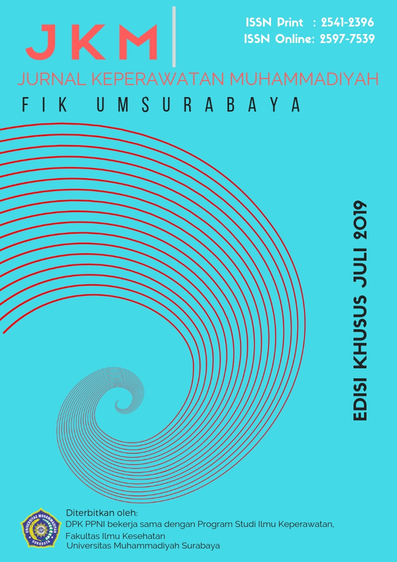Progressive Muscle Relaxation Dalam Menurunkan Nyeri
DOI:
https://doi.org/10.30651/jkm.v4i2.1905Keywords:
Progressive Muscle Relaxation, nyeriAbstract
Background: pain is a subjective response felt by an individual that caused by several conditions such as surgery or trauma, or due to disease process. pain management is needed to overcome such things as progressive muscle relaxation (PMR) techniques that can reduce anxiety and depression, improve sleep quality, reduce fatigue and reduce pain. Aims of this literature study was to evaluate the effect of progressive muscle relaxation (PMR) in reducing pain levels.
Methods: The data base used in this review literature is Pubmed, Science, Direct and google scholar
Results : Literature search from 42 articles obtained 5 articles that met the criteria. This study observe the effect of progressive muscle relaxation (PMR) on the level of pain. Some results shows progressive muscle relaxation (PMR) effectively decreases pain levels.
Conclusion: progressive muscle relaxation (PMR) is effective in reducing acute pain and chronic pain.
Keywords : progressive muscle relaxation, painReferences
Akmes, Z. B. (2014). Effects of Progressive Muscle Relaxation Exercises Accompanied by Music on Low Back Pain and Quality of Life During Pregnancy, 503–509. https://doi.org/10.1111/jmwh.12176
Apfelbaum, J. ., Chen, C., Mehta, S. ., & Gan, T. . (2003). Postoperative pain experience: Results from a national survey suggest postoperative pain continues to be undermanaged. Anesthesia and Analgesia, 97, 534–540.
Black, J. M., & Hawks, J. H. (2014). Keperawatan Medikal Bedah Manajemen Klinis dan Hasil Yang Diharapkan (Edisi 8). Singapore: Elseiver.
Charalambous, A., Giannakopoulou, M., Bozas, E., Marcou, Y., Kitsios, P., & Paikousis, L. (2016). Relaxation as a Cluster of Symptoms Management Intervention in Patients Receiving Chemotherapy : A Randomized Control Trial, 2(23), 1–18. https://doi.org/10.1371/journal.pone.0156911
Conrad, A., & Roth, W. T. (2007). Muscle relaxation therapy for anxiety disorders : It works but how ?, 21, 243–264. https://doi.org/10.1016/j.janxdis.2006.08.001
Evans, M. R. (2012). Pathophysiology of Pain and Pain Assessment Module 1 Pain Management : Pathophysiology of Pain and Pain Assessment American Academy of Orthopaedic Surgeons. American Medical Association., 7, 1–12.
Kobayashi, S., & Koitabashi, K. (2016). Complementary Therapies in Medicine Effects of progressive muscle relaxation on cerebral activity : An fMRI investigation. Complementary Therapies in Medicine, 26, 33–39. https://doi.org/10.1016/j.ctim.2016.02.010
Kumar, S., & Raje, A. (2014). ScienceDirect Effect of progressive muscular relaxation exercises versus transcutaneous electrical nerve stimulation on tension headache : A comparative study. Hong Kong Physiotherapy Journal, 32(2), 86–91. https://doi.org/10.1016/j.hkpj.2014.06.002
Kwekkeboom, K. L., & Wanta, B. (2008). Individual Difference Variables and the Effects of Progressive Muscle Relaxation and Analgesic Imagery Interventions on Cancer Pain. Journal of Pain and Symptom Management, 36(6), 604–615. https://doi.org/10.1016/j.jpainsymman.2007.12.011
LeMone, P., Burke, K. M., & Bauldoff, G. (2016). Buku Ajar Keperawatan Medikal Bedah. (A. Linda & R. P. Wulandari, Eds.) (Edisi 5). Jakarta: Penerbit Buku Kedokteran EGC.
Pathak, P., Mahal, R., Kohli, A., & Nimbran, V. (2013). Progressive Muscle Relaxation : An adjuvant therapy for reducing pain and fatigue among hospitalized cancer patients receiving radiotherapy, 2(2), 58–65.
Potter, P. A., & Perry, A. G. (2006). Buku Ajar Fundamental Keperawatan : Konsep, Proses dan Praktik. (M. Ester, D. Yulianti, & I. Parulian, Eds.) (Edisi 4). Jakarta: Penerbit Buku Kedokteran EGC.
Sands, L. (2004). Original Articles A Pilot Study of the Effectiveness of Guided Imagery with Progressive Muscle Relaxation to Reduce Chronic Pain and Mobility Difficulties of Osteoarthritis. American Society for Pain Management Nursing, 5(3), 97–104. https://doi.org/10.1016/j.pmn.2004.01.003
Snyder, M., & Lindquist, R. (2006). Complementary / Alternative Therapies in Nursing.
Solehati, T., & Rustina, Y. (2015). Benson Relaxation Technique in Reducing Pain Intensity in Women After Cesarean Section. Iranian Society of Regional Anesthesia and Pain Medicine (ISRAPM), 5(3). https://doi.org/10.5812/aapm.22236v2
Syarif, H., & Putra, A. (2014). Pengaruh Progressive Muscle Relaxation Terhadap Penurunan Kecemasan Pada Pasien Kanker Yang Menjalani Kemoterapi : Randomizes Clinical Trial. Idea Nursing Jurnal, V(3), 1–8.
Topcu, S. Y. (2012). Original Article Effect of Relaxation Exercises on Controlling Postoperative Pain. Pain Management Nursing, 13(1), 11–17. https://doi.org/10.1016/j.pmn.2010.07.006
Yudiyanta, Khoirunnisa, N., & Novitasari, R. W. (2015). Assessment Nyeri, 42(3), 214–234.
Downloads
Published
Issue
Section
License
- Penulis tetap memegang hak atas karyanya dan memberikan hak publikasi pertama kepada jurnal ini yang secara simultan karya tersebut dilisensikan di bawah:Â Creative Commons Attribution-ShareAlike 4.0 International (CC BY-SA 4.0)













